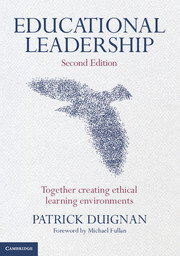Book contents
- Frontmatter
- Foreword
- Contents
- Acknowledgements
- INTRODUCTION AND OVERVIEW
- CHAPTER 1 THE CHANGING AND CHALLENGING CONTEXT FOR EDUCATIONAL LEADERS
- CHAPTER 2 KEY MACRO CHALLENGES FOR EDUCATIONAL LEADERS
- CHAPTER 3 KEY MICRO CHALLENGES FOR EDUCATIONAL LEADERS
- CHAPTER 4 LEADERSHIP CHALLENGES AS TENSIONS
- CHAPTER 5 A FRAMEWORK FOR ANALYSING ETHICAL TENSIONS
- CHAPTER 6 VISION-INSPIRED LEADERSHIP AND ETHICAL DECISION-MAKING
- CHAPTER 7 BUILDING A COLLECTIVE ETHIC OF RESPONSIBILITY FOR LEADERSHIP IN SCHOOLS
- CHAPTER 8 AUTHENTIC LEADERS USE THE POWER OF PRESENCE, AUTHENTIC RELATIONSHIPS, AND INFLUENCE FIELDS
- CHAPTER 9 AUTHENTIC LEADERS HELP CREATE INNOVATING, DEEP, RICH LEARNING ENVIRONMENTS
- CHAPTER 10 FORMING CAPABLE AND AUTHENTIC LEADERS: TRANSFORMATIONAL LEARNING APPROACHES
- References
- Index
CHAPTER 3 - KEY MICRO CHALLENGES FOR EDUCATIONAL LEADERS
Published online by Cambridge University Press: 05 June 2012
- Frontmatter
- Foreword
- Contents
- Acknowledgements
- INTRODUCTION AND OVERVIEW
- CHAPTER 1 THE CHANGING AND CHALLENGING CONTEXT FOR EDUCATIONAL LEADERS
- CHAPTER 2 KEY MACRO CHALLENGES FOR EDUCATIONAL LEADERS
- CHAPTER 3 KEY MICRO CHALLENGES FOR EDUCATIONAL LEADERS
- CHAPTER 4 LEADERSHIP CHALLENGES AS TENSIONS
- CHAPTER 5 A FRAMEWORK FOR ANALYSING ETHICAL TENSIONS
- CHAPTER 6 VISION-INSPIRED LEADERSHIP AND ETHICAL DECISION-MAKING
- CHAPTER 7 BUILDING A COLLECTIVE ETHIC OF RESPONSIBILITY FOR LEADERSHIP IN SCHOOLS
- CHAPTER 8 AUTHENTIC LEADERS USE THE POWER OF PRESENCE, AUTHENTIC RELATIONSHIPS, AND INFLUENCE FIELDS
- CHAPTER 9 AUTHENTIC LEADERS HELP CREATE INNOVATING, DEEP, RICH LEARNING ENVIRONMENTS
- CHAPTER 10 FORMING CAPABLE AND AUTHENTIC LEADERS: TRANSFORMATIONAL LEARNING APPROACHES
- References
- Index
Summary
The micro challenges in this chapter are accompanied by illustrative real-life cases generated by school leaders. Some of the details of these cases have been changed to help protect anonymity without affecting their key messages. The following cases appeared in the earlier version of this book but are still relevant to and valid in today's schools. The author has continued to interact with school leaders around the content of these cases, and they confirm the reality they represent for them in leading schools.
Personal and professional relationships
Most educational leaders will say that leadership is, essentially, relational. Those who have been apprenticed in a hierarchical, control-type model of leadership are, however, often unsure of how close they should relate to others, especially with those who are accountable to them. It is important to distinguish here between personal and professional relationships in organisations. Professional relationships will, of course, have a personal dimension, but it is equally important to develop personal relationships within a professional framework. The issue is not how friendly formal leaders should be with those who work with them, but how all organisational members can work together professionally as a team to achieve the goals and objectives of the organisation.
Professional relationships must always be predicated on the core values espoused in the organisation. Being honest, trusting and trustworthy, respectful, tolerant, empathetic, open to critique, and willing to be a team person are as essential to professional relationships as they are to the development and maintenance of personal relationships.
- Type
- Chapter
- Information
- Educational LeadershipTogether Creating Ethical Learning Environments, pp. 37 - 57Publisher: Cambridge University PressPrint publication year: 2012



